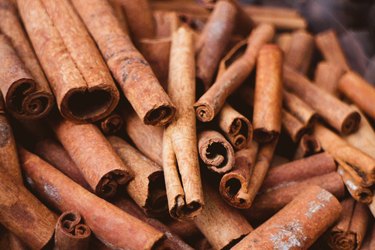
High blood pressure, or hypertension, is a common condition. In fact, blood pressure statistics show 1 out of every 3 adults in the U.S. has hypertension, which can lead to a heart attack, stroke, kidney disease and other health problems.
Hypertension is managed by a combination of medications and lifestyle changes -- such as decreasing dietary sodium, improving food choices and exercising regularly. The addition of cinnamon to the diet has also been suggested as a means to lower blood pressure, although research is mixed on the benefits, and how cinnamon fights hypertension is not fully understood.
Video of the Day
Video of the Day
What the Research Says
Cinnamon has a long history of medicinal and culinary use, and is proposed to improve health by fighting infections, preventing cancer and by reducing levels of blood sugar, cholesterol and blood pressure, according to an April 2014 report in Evidence Based Complementary and Alternative Medicine.
In fact, an October 2013 review in Nutrition analyzed 3 research trials and demonstrated that short-term administration of cinnamon significantly reduced blood pressure in people with prediabetes and diabetes.
On average, as little as one-half teaspoon of cinnamon a day was of benefit. But not all studies have shown this spice improves blood pressure, and evidence-based data on the dose, safety and effectiveness of cinnamon in the management of hypertension — and other medical conditions — is lacking, per the National Center for Complementary and Integrative Health (NCCIH).
How Cinnamon Helps
The reason cinnamon may help blood pressure is not fully understood, although more than one mechanism of action appears to be involved. For instance, animal studies have demonstrated that cinnamon dilates and relaxes blood vessels — changes that can lower blood pressure, per a June 2015 review in Pharmacognosy Research.
Cinnamon is also a source of antioxidants and has anti-inflammatory properties, which can also be involved in controlling hypertension, per the Evidence Based Complementary and Alternative Medicine review.
Cinnamon's potential role in managing weight and blood sugars may also be a mechanism for blood pressure improvement, because obesity and diabetes are linked to hypertension, according to a December 2016 study in the Iranian Journal of Basic Medical Sciences.
Type Matters
There are different varieties of cinnamon, and the type seems to matter. While cassia cinnamon, commonly used as a spice and the type found in cinnamon pills, is most popular, the more expensive and milder Ceylon cinnamon is more likely to be found in health food stores, according to the Evidence Based Complementary and Alternative Medicine review.
Both types have been shown to promote health benefits, but cassia cinnamon may not be as safe in large doses because it has relatively high concentrations of coumarin, a natural blood thinning agent which can also be toxic to the liver, per the NCCIH.
The Bottom Line
A complicating factor in cinnamon research is that scientists have used both cassia and Ceylon varieties in their trials, with different doses and varying cinnamon compounds — making it challenging to interpret how cinnamon works and how it can be used to manage health conditions.
In fact, the NCCIH concludes that currently, there is not enough data to support using cinnamon to manage any health conditions.
Warning
Spicing up your foods and drinks with cinnamon is a great way to add flavor, and it may even benefit your health. But if you plan to take cinnamon pills or use more than 1 teaspoon of cinnamon in your daily diet, talk to your doctor — especially if you're being treated for an underlying health condition.
Cassia cinnamon has large amounts of coumarin, and adding this spice to your diet may not be safe if you're on a blood-thinning agent or if you have liver disease.
- Center for Disease Control and Prevention: High Blood Pressure Fact Sheet
- National Institutes of Health: National Center for Complementary and Integrative Health: Cinnamon
- Pharmacognosy Research: Cinnamon: Mystic Powers of a Minute Ingredient
- Iranian Journal of Basic Medical Sciences: Cinnamon Effects on Metabolic Syndrome: A Review Based on its Mechanisms
- Nutrition: Effect of Short-Term Administration of Cinnamon on Blood Pressure in Patients with Prediabetes and Type 2 Diabetes.
- Evidence-Based Complementary and Alternative Medicine: Cinnamon: A Multifaceted Medicinal Plant
Is this an emergency? If you are experiencing serious medical symptoms, please see the National Library of Medicine’s list of signs you need emergency medical attention or call 911.